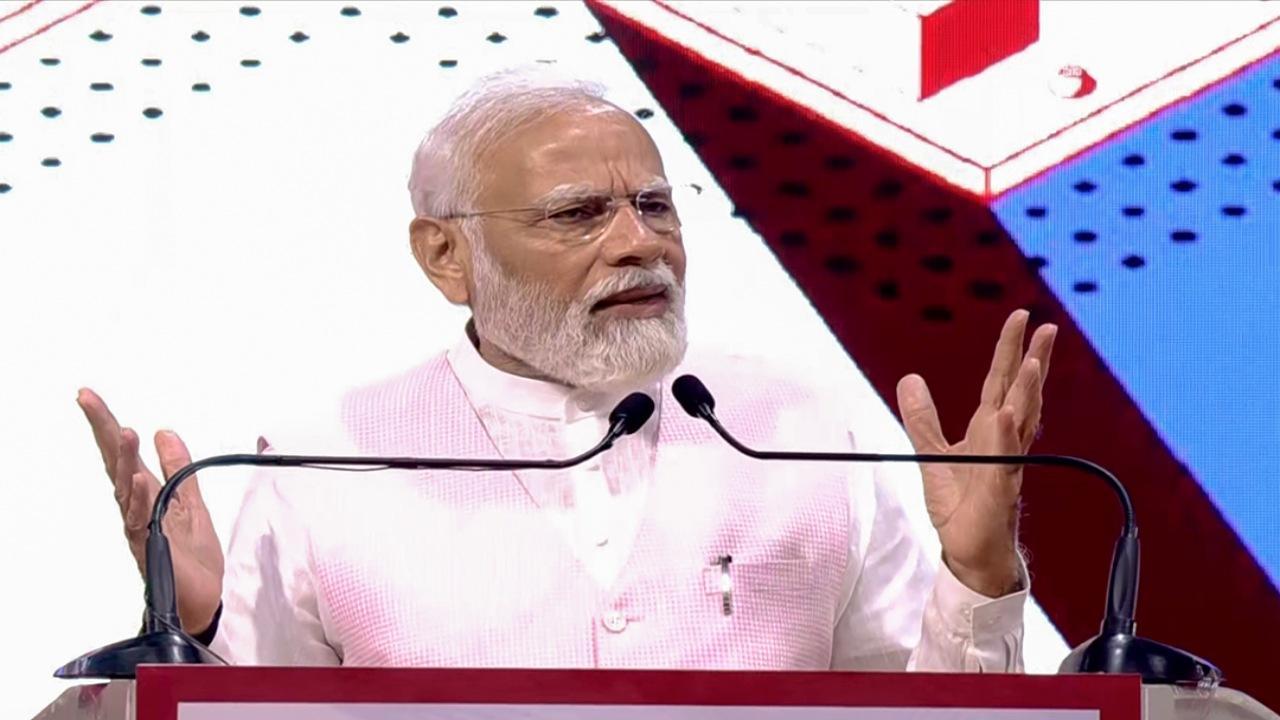Prime Minister Narendra Modi underlined that a lot of the heritage of India was lost during the period of slavery which lasted for hundreds of years when ancient manuscripts and libraries were burnt to the ground. The Prime Minister was speaking while inaugurating the International Museum Expo 2023 at Pragati Maidan in New Delhi

Prime Minister Narendra Modi addresses during the inauguration of the International Museum Expo 2023, at Pragati Maidan, in New Delhi on Thursday, May 18. ANI Photo
Prime Minister Narendra Modi Thursday underlined that a lot of the heritage of India was lost during the period of slavery which lasted for hundreds of years when ancient manuscripts and libraries were burnt to the ground. The Prime Minister emphasized that this was not just a loss to India but the heritage of the entire world. The Prime Minister was speaking while inaugurating the International Museum Expo 2023 at Pragati Maidan in New Delhi. He also inaugurated a virtual walkthrough of the upcoming National Museum at the North and South Blocks.
ADVERTISEMENT
He lamented the lack of efforts after independence towards reviving and preserving the long-lost heritage of the land where the lack of awareness among citizens created an even bigger impact.
Recalling the ‘Panch Pran’ or the five resolutions taken by the country during the Azadi Ka Amrit Kaal, the Prime Minister emphasized ‘taking pride in our heritage’ and underlined that a new cultural infrastructure of the country is being developed. In these efforts, the Prime Minister continued, one can find the history of India’s fight for independence as well as the thousand-year-old heritage of the country.
He informed that the Government is running a special campaign to conserve local and rural museums along with the heritage of every state and segment of society. The Prime Minister also mentioned that the development of ten special museums is underway to immortalize the contributions of the tribal communities in India’s freedom struggle, which will be one of the most unique initiatives in the world to provide a glimpse of tribal diversity.
Giving examples of conserving the heritage of the land, the Prime Minister mentioned Dandi Path where Mahatma Gandhi marched during the Salt Satyagraha and the memorial built at the spot where he broke the salt law.
The Prime Minister said when a country starts conserving its heritage it gives rise to closeness with other countries also. He gave examples of holy relics of Lord Buddha which were conserved over the generations and now uniting followers of Lord Buddha all over the world. He mentioned sending four holy relics to Mongolia on the last Buddha Poornima, the arrival of the holy relics from Sri Lanka to Kushinagar. Similarly, the legacy of St. Ketevan of Goa is safe with India and remembered the enthusiasm in Georgia when the relics were sent there. “Our heritage becomes the harbinger of world unity”, he said.
The Prime Minister mentioned the collective challenges of smuggling and appropriation of artefacts and said that countries with ancient cultures like India have been struggling with this for hundreds of years. He pointed out that many artefacts have been taken out of the country in an unethical manner before and after independence and urged everyone to work together to put an end to such crimes.
The Prime Minister suggested that the museums should become active participants in conserving the resources for the coming generations. He suggested that museums can conserve and present the signs of many calamities that the earth has faced, and presentation of the changing face of the earth can also be done.
He noted that Museums are becoming a career option for the youth. He said that we should not view these youth as mere museum workers but as youth associated with subjects like history and architecture that can become the medium of global cultural action. He said that these youth will be very effective in taking the nation's heritage abroad and learning from them about their past.
 Subscribe today by clicking the link and stay updated with the latest news!" Click here!
Subscribe today by clicking the link and stay updated with the latest news!" Click here!







